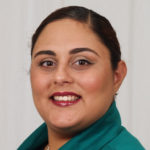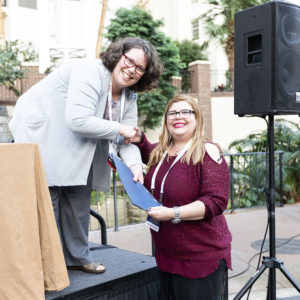Letter from the Editor: Proteus 2019 Summer Volume XXXII Issue No 1

Proteus
Issue: 2019 Summer Volume XXXII Issue No 1Table of Contents
Editor's Corner
Letter From the Editor Summer 2019

By Arianna M. Aguilar
Meet the Editors
Editors of Proteus

Arianna M. Aguilar has a degree in communications and has been interpreting and translating since 1999. She has been a certified court interpreter in North Carolina since 2005, and master certified Spanish-language court interpreter since 2013. She is president of Latino Outreach Consulting of NC, Inc., a translation and consulting agency, and is a published author. She has given presentations on a range of topics at both NAJIT and American Translators Association (ATA) conferences.

Andre Moskowitz is a Spanish-language interpreter certified by the United States federal courts and the California state courts. He is also a Hispanist, lexicographer and dialectologist, who has published a series of works in the areas of Spanish lexical dialectology and Spanish lexicography.He taught English in Colombia and Ecuador for four years, and holds a B.A. in humanities from Johns Hopkins University (1984), an M.A. in translation studies from the City University of New York Graduate Center (1988), and a second M.A. in Spanish with a minor in Portuguese from the University of Florida (1995). He is certified by the American Translators Association as a Portuguese>English, Spanish>English and English>Spanish translator. He is also an editor for Intercambios, the newsletter of the Spanish Language Division of the American Translators Association (ATA).
Feature Articles
Cultural Alignment: The Value of Intercultural Brokering to Enhance Linguistic Comprehension for Legal Purposes Outside the Courtroom

By Armando Ezquerra Hasbun
“Do not omit, add, embellish, or change the register or tone of the message.” Although this mantra of court interpreters applies while interpreting in court, there are specific instances outside of court, such as in the case of medical interpreting, in which an interpreter may be utilized as a cultural broker. This is essential to achieve the common goals of all participants. (more…)
Interpreters for Mediations

By Salua Kamerow
In Pennsylvania, the state where I live and work, roughly 5% of the population speaks Spanish at home and almost 1% speaks Chinese, Dutch, or German, among others. According to the United States Census Bureau, almost 20% of the residents of the United States speak a language other than English. In Pennsylvania, 11.8% of the people speak a non-English language, which leads one to believe that the totality of those groups may not be proficient in English.
Given that mix, the Pennsylvania Supreme Court has ordered language access for people with limited English proficiency (LEP), hearing loss and deafness. Since due process is one of the core values of the U.S. justice system, the courts stress the need to ensure that a defendant receives a fair trial. In that regard, the Pennsylvania court system promotes access to linguists (translators and interpreters) for LEP defendants. (more…)
How to Deal with Work Performance Anxiety

By Arianna M. Aguilar
Beating heart. Sweaty palms. Shortness of breath. Butterflies in the stomach. These are some of the physical symptoms of anxiety. When experienced while working, these feelings can be debilitating. If left untreated, they can negatively impact your life and career.
Yes, anxiety can adversely affect the quality of your interpretation. The Counseling and Psychological Services Department of UC Santa Cruz explains that poor concentration or lack of focus and distractibility are symptoms of anxiety. This can negatively affect your short-term memory.

Yes, anxiety can adversely affect the quality of your interpretation.
NAJIT News
Making the Case for Continuing Education Requirements
By The NAJIT Board of Directors
Whenever interpreters get together to share stories about their work “in the trenches,” the horror stories inevitably start to emerge. We hear stories about attorneys who try to shame us for the charges we put on our invoices, or agencies that offer every possible service for workers’ compensation, but for whom interpreting services are an afterthought. What steps can we take to change that dynamic? If we simply complain among ourselves, what would that really accomplish? We are professionals, but how can we persuade others to treat us as such? What does it truly mean to be a professional? What else do we need to do to truly talk the talk and walk the walk? What role do our professional associations play in all this?
NAJIT2019 Conference Roundup
2019 NAJIT Scholar Testimonial

2019 NAJIT Scholars
Daniel Galindo – John Jay College of Criminal Justice
Edda Raquel Jiron – Miami Dade College InterAmerican Campus
Edison Rodrigues – John Jay College of Criminal Justice
Mary Lou Romero – University of Louisville
Carolina Thomas – Florida International University
Edda Raquel Jiron
Attending the National Association of Judiciary Interpreters & Translators’ (NAJIT) 40th Annual Conference in Nashville, Tennessee, as one of the NAJIT Scholars this year has been a great experience. I was privileged to have learned and gained insight from professionals who shared their expertise, tips and advice to help us acquire strategies to become better interpreters and/or language professionals.
Interpreters are expected to cope with large amounts of information and must decide in a short period of time how to best retain and transmit the message they receive into the target language. At one of the sessions, the presenter provided attendees with valuable techniques and ways to improve our memory. He also explained in-depth the relationship between memory and note-taking. I personally think it’s important that we know the difference between those techniques and when to apply them individually. He also allowed us to have a few practice sessions where we constructed a narrative for ease of recall and improved self-confidence.
Regular Columns
For Better or Verse: Interpret This

By Hal Sillers
Interpret This
Attorney:
Madam witness, is it not true
Had you not been where you
Said you were not you’d not have got
To see what you did not view?
Witness:
Could you ask me that again?
I am not quite sure that I can
Get what you mean about what I’ve seen.
Go back to where you began.
Attorney:
Yes. Of course. So, Is it not so
Had you been, but did not go
Over to the place, nor to that space
You didn’t see and did not know?
Witness:
Your Honor, must I answer this?
A question that is by far amiss
Of any meaning, and It is demeaning.
If I respond I’ll surely be remiss.
Judge:
Counsel, will you please refrain
From asking questions so arcane
And so much awry I don’t wonder why
This witness feels she must abstain?
Attorney:
Of course, Your Honor, I’ll go back
To the beginning and stay on track,
Hoping to be clear, and thus will adhere
To the objective of my former tack.
Attorney:
Madam witness, is it not true
Had you not been where you
Said you were not you’d not have got
To see what you did not view?
And on it goes…

[Hal Sillers is a MN state and federally certified interpreter of Spanish and frequent contributor to this column. Hal is also the Staff Interpreter for the MN 8th Judicial District.]


